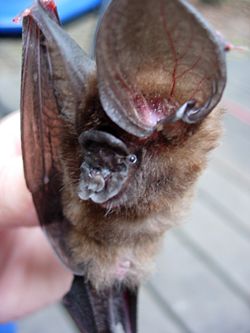| Ridley's leaf-nosed bat | |
|---|---|
 | |
| Scientific classification | |
| Kingdom: | Animalia |
| Phylum: | Chordata |
| Class: | Mammalia |
| Order: | Chiroptera |
| Family: | Hipposideridae |
| Genus: | Macronycteris |
| Species: | H. ridleyi |
| Binomial name | |
| Hipposideros ridleyi | |
 | |
| Ridley's leaf-nosed bat range | |
Ridley's leaf-nosed bat, Ridley's roundleaf bat, or Singapore roundleaf horseshoe bat (Hipposideros ridleyi) is a species of bat in the family Hipposideridae. It is found in Brunei, Malaysia and Singapore. Its natural habitat is subtropical or tropical swamps. It is threatened by habitat loss.
